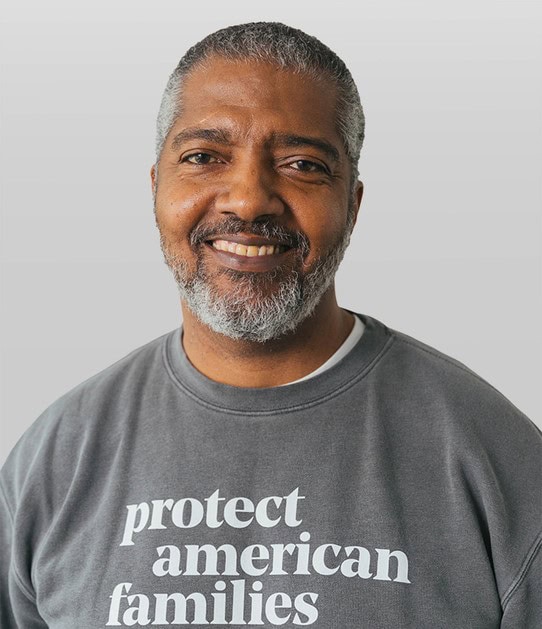When barriers to safety and success for people with a criminal record are removed, everyone stands to benefit. FWD.us Program Specialist Jarrell Allen—who spent 33 years behind bars—knows this firsthand.

We recently talked to Jarrell Allen, a BreakFree Education Fellow working for FWD.us as a seasonal program specialist. Jarrell served 33 years behind bars before receiving a sentence reduction under the District of Columbia’s Incarceration Reduction Amendment Act. A Free Minds Poet Ambassador, youth mentor, and volunteer, Jarrell lives in D.C.
Prison Fellowship: Why are second chances for people with a criminal record important?
Jarrell Allen: For some people with criminal records, their only chance at returning to society and redeeming themselves is by being given a second chance. I am an example of the impact of second chances: I was given another chance after I was convicted as a juvenile at age 17 and spent 33 years in prison. When I was released on December 23, 2020, at 50 years of age, I didn’t have housing or a job. Lawyers and other individuals who believed in the power of redemption, in the power of second chances, helped me find employment and housing. Second chances aren’t just for the person who was convicted. It also eases the financial burdens and mental strain placed on their families when incarcerated family members are given a new lease on life and a meaningful opportunity to be successful. Providing people with second chances creates a positive ripple effect—a proven asset for both the community and also the returning citizen—strengthening the economy and community ties, and allowing people to reconnect with family.
What happens when people are denied second chances?
Being denied a second chance sends a message that there is no pathway to forgiveness and redemption. My family gave me a second chance by supporting me mentally while in prison and believing that I’d grow to be a mature, rational individual who would do better when I was released. When you deny a person a second chance, you are refusing that person the right to correct themselves, correct their mistakes, and to really learn from their wrong choices. If I would’ve never been allowed second chances throughout my life, then I doubt I would have had much belief in anything at all. If there are no second chances, there is literally no hope and no room for change and growth.
How have you seen second chances benefit society at large?
Returning citizens are a good example of how society benefits from second chances. Since my release, I am sometimes both surprised and ecstatic at the accomplishments and growing energy of our returning citizens in D.C., myself included. I see familiar faces of men and women who have been incarcerated and are now working, mentoring youth, creating solutions, and raising families. It's such an incredible feeling to contribute positively to our community; those of us who have been given an opportunity to show that we are not only our worst choices have done just that. And there are so many more still behind bars who deserve that same chance. Just as we are an example of “what not to do,” we are also a representation of forgiveness. When you are willing to forgive others and also yourself, that becomes part of the healing process that's also needed within communities.
In October 2023, I became a BreakFree Education Fellow. Through this program, I am currently working at FWD.us, learning so much about criminal justice reform. And I have had an opportunity to learn new skills and continue to grow professionally. Returning citizens are a needed component in solving some societal issues; our families and our children benefit from our presence, experiences, and changed perspectives. Society benefits not only through our contributions to the workforce and economy, but more importantly in the variety of ways we contribute to our communities and families. Since I’ve been home, I’ve met so many decent and intelligent people, all because my judge decided to give me a second chance.
How can individuals and businesses help open doors for people who need a second chance?
Most people who have been impacted by the criminal justice system are behind the rest of society in some way. These individuals who really need a second chance—whether you’re a returning citizen, have been arrested, or struggling with substance use—you have lost some critical knowledge and resources related to housing, jobs, financial literacy, and other areas that individuals and businesses can assist you with. Businesses and individuals can offer opportunities for us to learn these necessary skills and show a willingness to be supportive of our reentry and treat us as people who are not defined only by our mistakes. By giving us a meaningful second chance, you allow those of us who need second chances to regain your trust through our actions and lives.
WHAT IS SECOND CHANCE MONTH?
Prison Fellowship spearheaded Second Chance Month® in 2017. Since then, multiple U.S. presidents and more than 25 states have recognized Second Chance Month. More than 800 organizations, congregations, and businesses have joined Prison Fellowship as official Second Chance Month partners. As a result of these efforts, millions of people know of the barriers faced by people with a criminal record and how to unlock second chances for people who dream of a better tomorrow.
DID YOU ENJOY THIS ARTICLE?
Make sure you don't miss out on any of our helpful articles and incredible transformation stories! Sign up to receive our weekly newsletter, and you'll get great content delivered directly to your inbox.
Your privacy is safe with us. We will never sell, trade, or share your personal information.